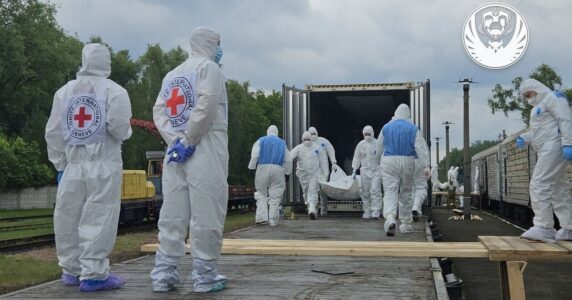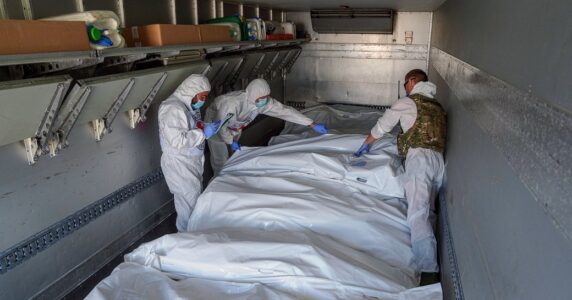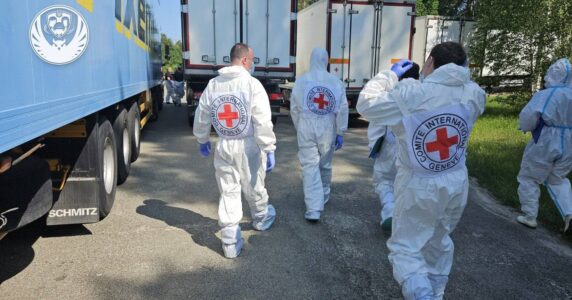Navigation and useful materials
While at home, Russian propagandists do everything possible to criticize anti-vaxxers, going so far as to advocate for criminal liability, they broadcast entirely different messages for external audiences. They do everything possible to destabilize the global situation, disseminate fakes and conspiracy theories on vaccination and make every effort to divide society into two groups: those who support vaccination and those who object.
Kremlin Disinformation for All but Russians
“A decade of health disinformation promoted by President Vladimir Putin of Russia has sown wide confusion, hurt major institutions and encouraged the spread of deadly illnesses… “Mr. Putin’s campaign of health misinformation [is] now a global enterprise,” The New York Times reported in April 2020.
Molecular biologist Henry I. Miller compared Russia’s latest anti-vaccine propaganda campaign to a “declaration of war.” Its purpose is to “promote discord,” “damage health,” “injure and kill.”
At the same time, within Russia, Putin has been a staunch proponent of vaccines, according to The New York Times. He publicly reprimands those who refuse to be vaccinated and endanger the lives of others.
The infamous propagandist Kiselyov harshly criticizes those who object to vaccines for ignorance and stupidity, and even blames “foreign influence” for this.
“We have a true cult-like organized crime group before us, which systemically kills off the population of the Russian Federation… Such structures are funded from abroad and aim not only to reduce the country’s population, but also to undermine Russia’s health care system to increase discontent. This is meant to lead to mass riots,” says the Vesti program, urging to introduce criminal liability for anti-vaxxers.
Unsurprisingly, Russian propagandists blame others for their own wrongdoings, accidentally revealing the true goals of the anti-vaccination campaign led by Russia itself. Because what is broadcast outside with the Kremlin’s support is not common sense, but twisted conspiracy theories.
Russia’s efforts essentially backfired. Many deaths and refusals to vaccinate in Russia are tied to the Kremlin’s own anti-vaccine propaganda, said EU’s Foreign Ministry at the end of October.
“Kremlin media continue spreading lies on Covid-19 and the vaccines, even as the death tolls in Russia are surging,” says the statement, noting 250 anti-vaccination stories on Russian outlet Geopolitica.ru alone.
How Russian Fakes about the Vaccine Work in Ukraine
The Centre for Combating Disinformation at the National Security and Defence Council of Ukraine analysed media content and identified a special information operation by Russia aiming to reduce vaccination levels among Ukrainians as much as possible.
The campaign is conducted through Telegram channels, which are run from the Russian Federation or are affiliated with it one way or another.
Here are some examples of fakes disseminated through Russian Telegram channels:
- vaccination does not help against the coronavirus;
- vaccination has exacerbated the pandemic;
- vaccination is coercion and violation of human rights;
- the vaccine is extremely dangerous, and the authorities are trying to maim children
Interestingly, Telegram channels which target the temporarily occupied territories of Donetsk and Luhansk oblasts and the illegally annexed Crimea demonstrate a wholly different position on vaccination: there, they talk about the importance and necessity of vaccinations, ridicule anti-vaccinators, and engage opinion leaders to promote getting a vaccine.
According to a study by UNDP and UNICEF, in 2020, more than 250,000 fake messages about the coronavirus were recorded on Ukrainian social networks. This was announced by Minister of Culture and Information Policy Oleksandr Tkachenko on his Telegram channel. He also highlighted that, according to the Oxford Institute of the Internet, Russia and China account for 92% of disinformation on COVID.
According to the head of the Parliament Committee on Public Health Mykhailo Radutskyi, in September alone, they terminated 56,000 bot accounts with proven transactions of funds from Russia which were conducting an anti-vaccination campaign.
The history of resistance to vaccinations is as long as the history of vaccination itself. The rise of the anti-vaccination movement is partly due to a general misunderstanding of how vaccines work. In addition, the spread of misinformation is fuelled by the belief that vaccines are harmful or that vaccinations violate personal, political or religious rights.
According to medical historians, opponents of the smallpox vaccine in the 19th century claimed that:
- The vaccine does not work
- The vaccine makes you sick and contains toxic chemicals
- Mandatory vaccinations resemble “medical despotism”
Little has changed since then, other than some new shocking theories emerging. But what has definitely changed is the powerful players in the field of information, who use ignorance, distrust, fears and phobias to sow chaos by disseminating fakes. Russia is an experienced entity in that field.
Although resistance to vaccination exists almost everywhere to a certain extent, the Baltic countries serve as a good example, showing how Russian-speaking population, the most vulnerable to Russian propaganda, slows down vaccination rates.
“In the Baltic States, Kremlin anti-vaccination propaganda has primarily hit those whom the Russian government calls compatriots. They still do not have enough knowledge of the state languages of the three countries and are therefore more sensitive to the Kremlin’s propaganda. They are afraid of European vaccinations, which many Russians dream of, and hope for Sputnik V, which many Russians are reluctant to use. Russian-speaking residents of Baltic countries tend to refuse to get vaccinated, which means they have the greatest risk of getting infected with the new COVID-19 variant,” writes the Lithuanian outlet Res Publica.
“By defending the reputation of their vaccine, Kremlin propagandists risk the lives of hundreds or even thousands of people who are scared and do not want to be vaccinated. Their deaths will be on the conscience of Kremlin propagandists,” said Lithuanian Deputy Foreign Minister Mantas Adomenas.
Some residents of Narva, Estonia’s largest Russian-speaking city, are refusing to be vaccinated, fearing that they will “grow hooves and horns.”
On October 28, the Latvian Office of Statistics published data that Russians accounted for 42% of patients in Latvian hospitals, even though they constitute just 25% of the country’s population. In some hospitals, 4 in 5 patients with COVID-19 are Russian speakers.
The same can be observed in Germany, where Russian speakers are also drivers behind anti-vaxxer protests.
Citizens of Ukraine join the anti-vaccination movement for a variety of reasons—due to religious or ideological beliefs, fears and phobias, distrust of state institutions or social dissatisfaction. But the leaders of this movement can be tracked back to participation either in pro-Russian initiatives / organizations or openly provocative activities.
For instance, here is what one of the organizers of the anti-vaccination demonstration in downtown Kyiv on November 3 said. At a rally near the Parliament, Olena Faist from Cherkasy proclaimed the following slogans: “We are Slavic brothers!”, “United people!”, “This is an artificial war, which does not really exist!” Faist openly stated that the money for anti-vaccination protests comes from Russia, among other sources.In the summer, Faist frightened her subscribers that all vaccinated people would turn into transgenic biorobots, which would be destroyed en masse in the fall.
Pavlo Bulhak, an adviser to the Minister of Youth and Sports, said that the anti-vaccination rally near the Parliament had all signs of an external information special operation.
He pointed out that a group of people holding posters with anti-vaccination slogans with the words “Terra Freedom” was very active at the rally.
This group has a Facebook page, created in February 2021, and a Telegram channel. According to Bulhak, the leader and ideologue of the group is a pro-Russian politician, Moldovan citizen Vyacheslav Valko.
Valko considers Crimea to be Russian and claims that in Ukraine, “the Americans are working on Zelenskyy to provoke another conflict in Donbas, which Russians don’t freaking need.” He also threatens that the Romanian army intends to occupy the territory of Moldova.
The analysis of group posts shows that the so-called “organization of resistance” systemically works to discredit anti-COVID measures and vaccination in Moldova, Ukraine, and Baltic countries by organizing rallies and demonstrations with characteristic posters and symbols. Similar demonstrations and rallies have been held in Moldova as well. “This gives reason to believe that the group is acting to support Russia’s interests,” writes Bulhak.
If you have found a spelling error, please, notify us by selecting that text and pressing Ctrl+Enter.


